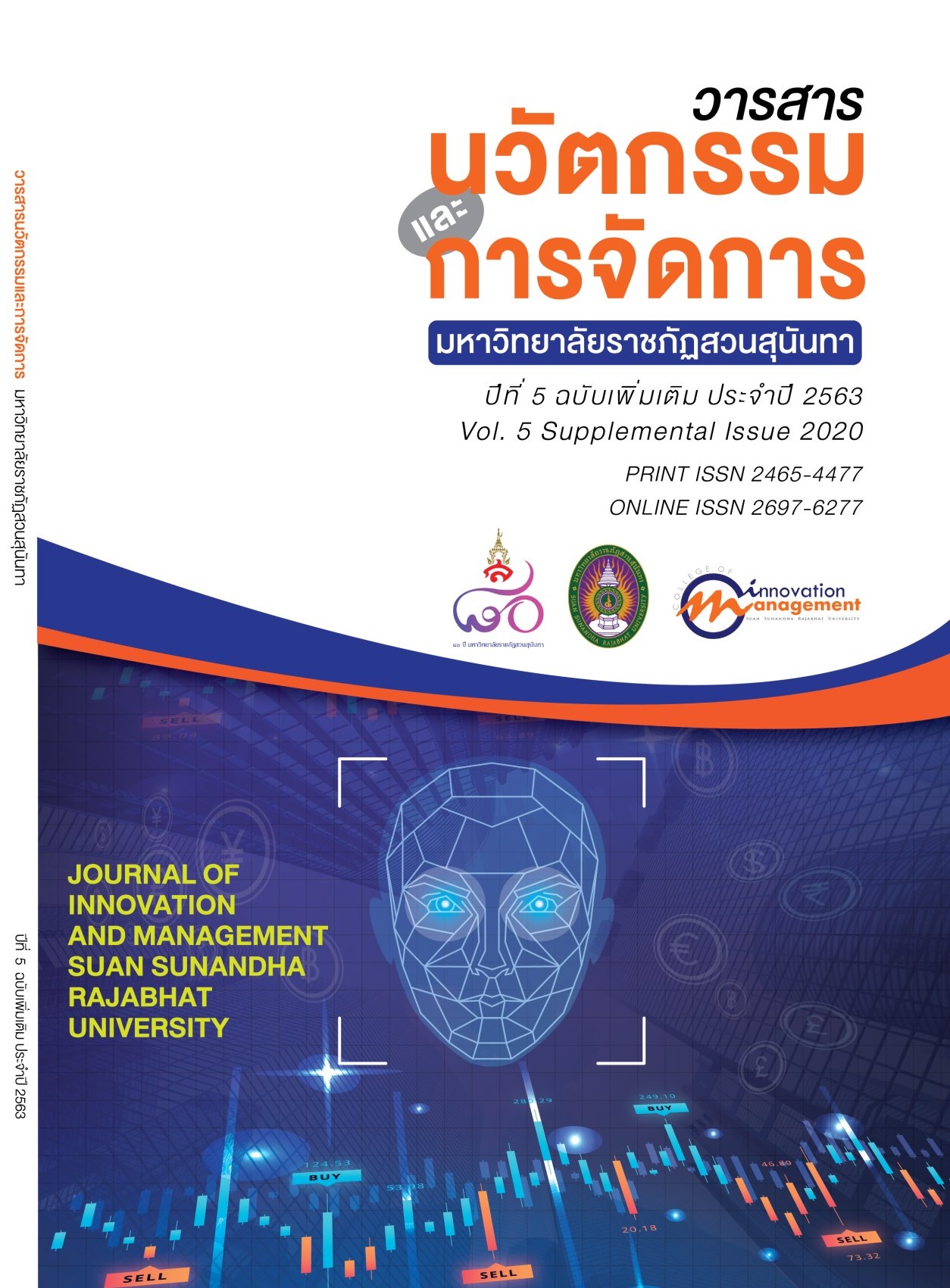Factors Affecting Adoption of The Inventory Management Application of Jetion Solar (Thailand) Company Limited
Keywords:
Technology Acceptance, Application, InventoryAbstract
The objective of this research is to study the level of acceptance of the use of inventory management applications and to study the factors that affect the acceptance of the use of inventory management applications of Jetion Solar (Thailand) Co., Ltd. It is a quantitative research. Data was collected from 219 employees of Jetion Solar (Thailand) Co., Ltd. The questionnaires that passed validity checks and confidence values. Percentage, mean, standard deviation, and hypothesis testing by using multiple regression analysis, the research found that technology acceptance factors have a significant effect on the acceptance of the use of inventory management applications that .05 The hypothesis testing can be summarized as follows: perceived independent variables that are useful for use (x1) affect the most according to the acceptance of the use of inventory management applications ( ) followed by perceived ease of use (x2), attitude towards usage (x3) and intention usage behavior (x4) respectively, can explain the acceptance of use of the app Inventory management application of Jetion Solar (Thailand) Co., Ltd. is 63.0%, as shown in the following equation.
References
Ajzen, I., and Fishbein, M. (1972). Attitudes and normative beliefs as factors influencing Behavioral intentions. Journal of Personality and Social Psychology, 21(1), 1-9.
Cheong, J. H., and Park, M. C. (2005). Mobile internet acceptance in Korea. Internet Research, 15(2), 125 – 140.
Davis, F.D. (1989). Perceived usefulness, perceived ease of use and user acceptance of information technology. MIS Quarterly, 13(3), 319-340.
Deloan, W. and McLean, E. (2003). The DeLone and McLean Model of Information System Success: A Ten-Year Update. Journal of Management Information Systems, 19(4), 9-30.
Heinich, R., Molenda, M., and Russell, J.D. (1993). Instructional media and the new technologies of instruction. 4th ed. New York: Macmillan.
Junadi, S. (2015). A model of factors influencing consumer’s intention to use e-payment system in Indonesia. Procedia Computer Science, 59, 214-220.
Kaewkheiw, P. (2012). Adoption of internet using on mobile phont among adolescents in Bangkok. Thesis of the Degree of Master of Business Administration. Bangkok: Kasetsart University. (in Thai)
Kim, G.S. Park, S. B., and Oh, J. (2008). An examination of factors influencing consumer adoption of short message service (SMS). Psychology & Marketing, 25(8), 769–786.
Laeieddeenun, K. (2014). Technology Acceptance and Online Consumer Behavior Affecting E-Books’ Purchase Decisions of Customers in Bangkok. Thesis of the Degree of Master of Business Administration. Bangkok: Bangkok University. (inThai)
Lalitaporn, P. (2009). Inventory management. Bangkok: Technology Promotion Association (Thailand-Japan). (in Thai)
Meesom, D. (2016). Factor Influencing Intention to use Line Man Application Among Customer in Bangkok. Thesis of the Degree of Master of Business Administration. Bangkok: Srinakharinwirot University. (in Thai)
Ounjangwang, J. (2013). Increase Efficiency of Inventory Management. Thesis of the Degree of Master of Science in Integrated Supply Chain Management. Nonthaburi: Dhurakij Pundit University. (in Thai)
Pakdeesamai, A. (2010). Acceptance and Intention of using electronic hemp bidding system, In case: Electronic component assembly Industry in Laem Chabang Industrial Estate. Thesis of the Degree of Master of Master’s thesis, College of Innovation, Thammasat University. (in Thai)
Palachaipiromsilp, S. (2011). Usage Trend of Mobile Application. Executive Journal, 31(4), 110-115. (in Thai)
Pawapaiboon, V. and Yutthana, S. (2015). Factors Influencing English Language Teachers’ Acceptance of Using Tablets in Primary Schools under the Phitsanulok Primary Educational Service Area Office 1. Journal of Education Naresuan University, 17, (1), 138–149. (in Thai)
Tansupong, S. M.S. (2014). Factors Influencing the Adoption of Line Application. (Graduate School, Bangkok University). (in Thai)
Tantijirasakun, C. (2019). The Goods Categorization Layout for Reducing Time Spent on a Reach of Goods: A Case Study of AAA Company. Bangkok: College of Logistics and Supply Chain Management, Suan Sunandha Rajabhat University. (in Thai)
Vongsumet, P. (2013). Factors Influencing the Adoption of Web-Based Learning System. Thesis of the Degree of Master of Business Administration. Bangkok: Bangkok University). (in Thai)
Water, C. D. (2003). Inventory Control and Management. 2nd ed. Sussex, England: John Wiley & Sons.
Webster, M. (2003). Merriam-Webster’s Collegiate Dictionary. 11th ed. Massachusetts: Merriam - Webster, Incorporated.
Downloads
Published
How to Cite
Issue
Section
License
Copyright (c) 2020 Journal of Innovation and Management

This work is licensed under a Creative Commons Attribution-NonCommercial-NoDerivatives 4.0 International License.
See Publication Ethics https://so03.tci-thaijo.org/index.php/journalcim/Ethics






